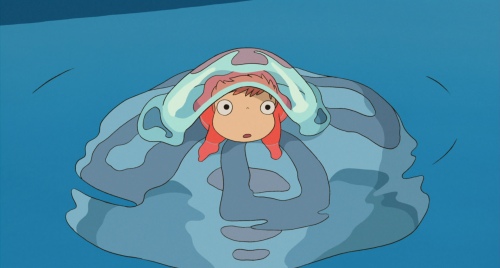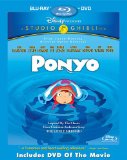| Reviews & Columns |
|
Reviews DVD TV on DVD Blu-ray 4K UHD International DVDs In Theaters Reviews by Studio Video Games Features Collector Series DVDs Easter Egg Database Interviews DVD Talk Radio Feature Articles Columns Anime Talk DVD Savant Horror DVDs The M.O.D. Squad Art House HD Talk Silent DVD
|
DVD Talk Forum |
|
|
| Resources |
|
DVD Price Search Customer Service #'s RCE Info Links |
|
Columns
|
|
|
Ponyo
Walt Disney Studios Home Entertainment // G // March 2, 2010
List Price: $39.99 [Buy now and save at Amazon]
I know the feeling. I had that exact same wide-eyed look of awe and wonder in my eyes as I watched Ponyo. Then again, this is a Hayao Miyazaki film; how could I not be entranced?
At least partially inspired by Hans Christian Andersen's The Little Mermaid, Ponyo opens -- where else? -- under the sea. We're quickly
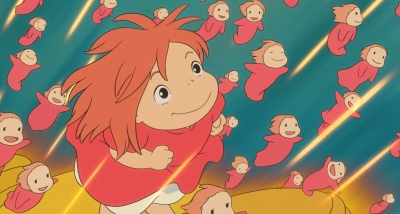 |
| [click on the thumbnail to enlarge] |
Ponyo has a playfulness that harkens back to My Neighbor Totoro. Much like that earlier film of Miyazaki's, there isn't any sort of moustache-twirling villain to overcome. Neither film ever gets overly distracted by the plot; the story's really only there to introduce these characters and to build out a fantastic dream world for Miyazaki to explore. In fact, there's quite a bit of backstory that Ponyo glosses over -- quick off-hand mentions like Fujimoto stating that he'd renounced being human without any sort of flashback or exposition explaining why -- but that completely works in the context of the film. Ponyo doesn't explain any more than is absolutely necessary to understand the scene that's currently unspooling in front of you. Miyazaki has always been one to prefer to show rather than tell, and part of the magical wonder the film inspires is drawn from that abstract approach...its disinterest in explaining every last detail. You're seeing these events unfold through the eyes of a five year old, after all, so everything is kind of a fascinating new adventure. Don't take 'adventure' the wrong way, though; there isn't any sense that Ponyo or Sosuke are ever in any immediate danger. Ponyo is a film about discovery and familial love, not breakneck escapes or manic chases. There's no darkness and little danger at all, and even the youngest viewers shouldn't be upset by any of the imagery that's splashed across the screen.
One of the things I've always loved so much about many of Miyazaki's films is the way he marries his spectacularly surreal imagery with tiny character moments. One of the most visually dazzling sequences in the movie comes as Ponyo darts across the
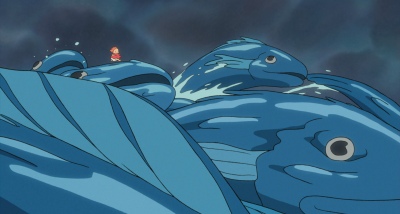 |
| [click on the thumbnail to enlarge] |
Some viewers may be turned off by the stripped-down plot...the limited action and Ponyo's lack of interest in explaining the mechanics of what makes this world work. To me, these are strengths, not missteps. If Ponyo does anything wrong, it's that the film repeatedly states that Sosuke and Ponyo's adventure is building up to an important test, but what takes the place of the climax instead is something much simpler and low-key. The resolution is absolutely charming, seamlessly fitting the tone and approach of the rest of the movie up to that point, but it almost seems as if Miyazaki is just trying to brush the ending out of the way. He's far more driven in introducing these characters and spending time with them, not trying to come up with the best way to shove them out of the frame now that Ponyo has come to an end. I also greatly appreciate the fact that the two young children that drive Ponyo are so warm and likeable. They're not snarky and sarcastic the way the leads in a lot of movies these days so often are, and that lack of cynicism makes their awe that much more infectious. There aren't any clunky pop culture references or bodily humor gags to get in the way either. Ponyo is so artfully crafted -- so warm, so funny, so intelligent -- that it doesn't need to lean on that sort of laziness as a crutch.
There's also no
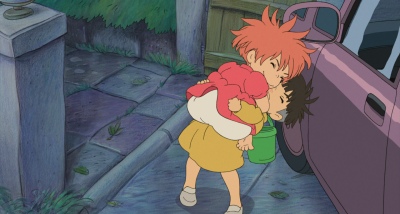 |
| [click on the thumbnail to enlarge] |
I've seen Ponyo repeatedly dismissed as one of Miyazaki's lesser films, but even though this isn't a movie that's particularly deep or fraught with danger, I was never anything less than entranced throughout. I'd go so far as to say it's my favorite work of his from the past decade, resonating with me in a way that the Academy Award-winning Spirited Away never quite did. Like Kiki's Delivery Service and My Neighbor Totoro before it, Ponyo brings out the gentler side of Miyazaki, one that looks at the world with a child's sense of awe and wonder. The film never panders to its audience, instead relying on its sublime beauty and richly-drawn characters to draw viewers into its world. As terrific a year as 2009 was for animation, Ponyo may be my favorite of all of last year's many animated releases, and I'm tempted to say that it ranks among the best of the year, animated or otherwise. Very, very Highly Recommended.
It's also worth noting that Ponyo uses seamless branching to distinguish between the Japanese and American versions of the film on this disc. The English version has different opening and closing titles, including a dance-pop take on Joe Hisaishi's title track. When the Japanese option is selected through the Languages menu, its original titles are presented instead.
Video
Wow.
Ponyo is one of the singularly most gorgeous films I've ever had the joy of experiencing in high definition. This Blu-ray disc is a showcase for the dazzling artistry and craftsmanship of Studio Ghibli: the fluidity of the animation, the startling crispness and clarity of the line work, and its bright, breathtakingly vivid palette. The brilliant blues of the ocean, the lush greens of Sosuke's lawn, and the candy-colored sealife and clothing could just never hope to be reproduced like this on DVD. This Blu-ray disc also does a spectacular job bringing out the texture of Ponyo's hand-crafted backgrounds, and when the camera eases back, characters that'd be reduced to a muddy smudge on DVD remain clearly defined here. As Ponyo has been transferred to Blu-ray directly from digital elements, there isn't any wear or film grain to fret about either. The 1.85:1 image is remarkably clean and clear, not marred by any trace of edge enhancement, excessive digital noise reduction, or any hiccups whatsoever in its AVC encode. I'm floored by just how indescribably beautiful Ponyo is in high definition, and honestly, Miyazaki enthusiasts who've been on the fence about upgrading to Blu-ray may find this disc alone to warrant an investment in a BD player. It's absolutely flawless, and I'm now even more eagerly anticipating further Studio Ghibli releases on the format.
Audio
Although
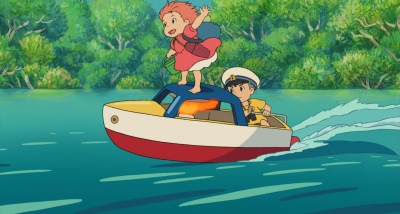 |
| [click on the thumbnail to enlarge] |
Purists may still be scowling, but it's worth noting that the English dub really is terrific. The lead performances by Noah Cyrus and Frankie Jonas are sweetly charming, and it's easily argued that Jonas even does a better job conveying that Sosuke is only five years old. If not for a couple of direct mentions of his age and the fact that he's still enrolled in pre-school, it's not hard to picture from the Japanese version that a character as independent as Sosuke is closer to seven; Jonas does a more convincing job making it feel as if Sosuke and Ponyo are much closer in age. Ponyo's dub isn't a direct translation of the Japanese dialogue, but it doesn't take any sweeping liberties, and the adjusted script even fleshes out a few minor story points that the Japanese release glosses over. I'll freely admit to liking Ponyo's dub, but still, the Japanese audio just sounds right to me. I can't quantify it, exactly; the original performances just gel better to my mind with the imagery being splashed across the screen. There's a certain tone...a certain feeling...that the Japanese dialogue evokes that the English dub can't quite reproduce.
The sound design sparkles in both
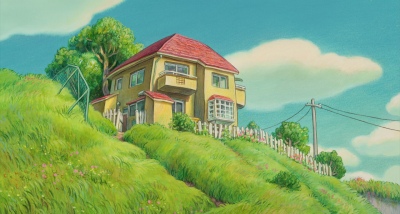 |
| [click on the thumbnail to enlarge] |
The Blu-ray release of Ponyo in Japan -- also being issued by Disney, by the way -- reverses the situation we're seeing on these shores: lossless Japanese audio and a lossy English dub. Unfortunately, the price tag for an import is pretty daunting, and purists can expect to pay at least a $30-$40 premium if they want a master-quality version of the film's original soundtrack. I'd have rated this Blu-ray disc a perfect five stars if the quality of the Japanese audio on this disc matched the spectacular sound of the English dub. What's offered here in Ponyo's native tongue does sound great, but the presentation still certainly pales by comparison.
When selecting the Japanese soundtrack, traditional English subtitles are selected by default. The dub only features English subtitles that are captioned for the deaf and hard of hearing along with French and Spanish streams. A French dub is also available in Dolby Digital 5.1.
Extras
- Meet Ponyo (3 min.; HD): Ponyo opens with an optional introduction that touches on Studio Ghibli's relationship with Disney and how much love and care went into bringing the film over to these shores.
- Storyboards: This
picture-in-picture extra places all of the storyboards for Ponyo -- many of which have been lovingly painted -- in a small window in the corner as the movie unspools.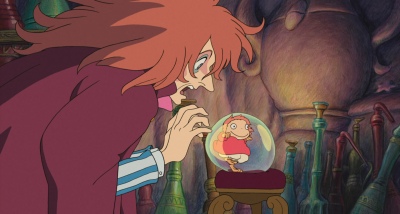
[click on the thumbnail to enlarge]
- The World of Ghibli (HD): "Enter the Lands" presents all of Studio Ghibli's films as being part of one giant island, appropriately enough. Characters spanning many different movies are scattered throughout, but viewers can only hone in on four of these films. Ponyo features a quick quiz that'll tell a player which character from the film he or she is the most like. The others explore each of the main characters from Kiki's Delivery Service, My Neighbor Totoro, and Castle in the Sky, serving up very lengthy montages accompanied by voiceover narration from each film. Even a few props are interactive, such as Totoro's spinning top and Kiki's radio.
- A Conversation with Hayao Miyazaki and John Lasseter (4 min.; HD): In this conversation between two of the most towering talents in animation today, Miyazaki speaks about the different character designs, including the initial inspiration for Ponyo and what each of her forms represent. Lasseter also prompts a discussion about the stylized way water is presented in the film.
- Creating Ponyo (4 min.; HD): Miyazaki opens the featurette by explaining that he wanted to make a film geared towards five year olds, an audience he'd never fully embraced previously. The central focus of the conversation is mankind's relationship with nature and how Ponyo plays into that concept. Miyazaki also delves into the character of Sosuke and how he embraces the wild, uninhibited Ponyo for who she really is.
- Ponyo and Fujimoto (4 min.; HD): The second character-centric featurette swirls around the relationship between father and daughter as well as how this ties into Japanese culture. Miyazaki also reveals the origin of Ponyo's name.
- The Nursery (2 min.; HD): Miyazaki was inspired to open a children's nursery at the Studio Ghibli compound, and "The Nursery" offers a glimpse at how it impacted Ponyo and nearly became an integral backdrop for the film.
- Producer's Perspective: Telling the Story (2 min.; HD): The stories for each of Miyazaki's films have all been constructed in a very similar way, and "Producer's Perspective" follows that process from the initial image board brainstorming all the way through to the fully-polished animation.
- The Locations of Ponyo (10 min.; HD): The longest of the disc's featurettes, "The Locations of Ponyo" offers a peek at how a company retreat to Seto Inland Sea had a profound impact on Miyazaki. The writer/director was compelled to return to this sleepy port town for an extended stay that crept into Spirited Away and greatly inspired Ponyo. The featurette takes viewers on a tour through the town, including a look at the real-life house on the cliff by the sea. Finally, we learn how the heritage of this time capsule of a town is being threatened by looming modernization.
- Scoring Miyazaki (7 min.; HD): Joe Hisaishi doesn't stop at telling the story of jotting down the melody for Ponyo's theme in the very first meeting about the movie. No, he
also delves into the themes for the other Ghibli films being re-released in this wave on DVD: My Neighbor Totoro, Kiki's Delivery Service, and the midnight inspiration of Castle in the Sky.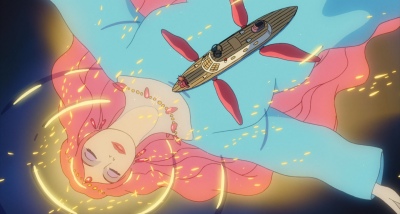
[click on the thumbnail to enlarge]
- Behind the Microphone: The Voices of Ponyo (6 min.; HD): The last of Ponyo's featurettes is an extended look at the English dub being assembled, including quite a bit of footage of the cast at work, and seemingly everyone has a chance to speak about their take on the story and their performances.
- Trailers (3 min.; HD): Two of Ponyo's original Japanese trailers have also been included on this Blu-ray disc. High definition trailers are also offered for a slew of other Disney releases, including Beauty and the Beast, Toy Story 3, and Fantasia.
- Other Studio Ghibli Releases (8 min.; HD): To further cross-promote the DVD re-releases of a few other Studio Ghibli films, brief but still very intriguing retrospective featurettes are offered for My Neighbor Totoro and Kiki's Delivery Service. Castle in the Sky isn't given quite that same sort of attention, but its three minute segment does feature high-resolution scans of character sketches from the film.
Ponyo also comes packaged with a standard definition DVD of the film, and the set arrives in a glossy, embossed cardboard sleeve. This is a BD Live-enabled release, but as I write this, the switch hasn't been flipped on for any of that online functionality.
The Final Word
Ponyo is aimed at a younger audience than most of Miyazaki's films, and the story is simpler than usual to match. Still, Ponyo captures every bit of the magic and wide-eyed awe I've come to expect from Studio Ghibli. It's a sweet, charming film that draws its strength not through sprawling, incendiary battles but through small splashes of color from characters it deeply, truly loves. That attention to detail coupled with Miyazaki's incomparable visual eye and the studio's entrancingly gorgeous animation make for one of the most memorable experiences I've had watching a film on Blu-ray...animated or otherwise. The only disappointment I have with this Blu-ray disc is that the original Japanese soundtrack hasn't been lavished with the same quality audio as the English dub, but considering how exceptional the film and every other aspect of this disc is, Ponyo very much still comes Highly Recommended.
Additional Notes
Disney has a $10 off coupon for Ponyo available at www.ponyocoupon.com. Ponyo would've come enthusiastically recommended regardless, but especially after taking this additional discount into consideration, this Blu-ray disc is all but impossible to overlook.
|
| Popular Reviews |
| Sponsored Links |
|
|
| Sponsored Links |
|
|
| Release List | Reviews | Shop | Newsletter | Forum | DVD Giveaways | Blu-Ray | Advertise |
|
Copyright 2024 DVDTalk.com All Rights Reserved. Legal Info, Privacy Policy, Terms of Use,
Manage Preferences,
Your Privacy Choices | |||||||









